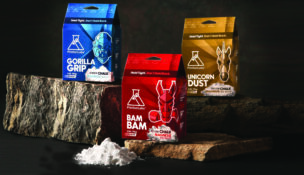How to Avoid Greenwashing Schemes
Today’s consumers demand eco-consciousness, in practice, and as ethically advertised.
Noah Rue //February 28, 2022//


How to Avoid Greenwashing Schemes
Today’s consumers demand eco-consciousness, in practice, and as ethically advertised.
Noah Rue //February 28, 2022//
With sustainability trending, we are seeing an increase in brands and products that appeal to more eco-conscious consumers. Today’s customers are prioritizing sustainability and are more attracted to brands that appeal to their desires to be more mindful and environmentally friendly.
Unfortunately, some companies are taking advantage of this trend by creating products and using marketing tactics that make them seem eco-conscious when in reality, they are not. This refers to the term, “greenwashing,” and the practice of it is dangerous and deceitful.
Pretending to be a sustainable business when care for the environment is actually not part of the equation, and with little effort to reduce environmental impact — will ultimately harm your business. Superficial green practices can tarnish your brand reputation and cost you your loyal customers, which can negatively affect your growth and profits. So it’s important to make genuine and lasting sustainable changes if you want to truly minimize your impact and appeal to today’s consumers.
Today’s consumers are more discerning than ever before. They value mindfulness, inclusivity, and sustainability in their personal lives, and they are starting to demand it of the brands they support as well.
Customers Want Sustainable Brands
Though climate change and sustainability are topics that have been around for years, they have only recently started to trend. We’ve been taught about climate change and our impact on the environment. But it is only now, with the rise of newer and younger generations of consumers, that sustainability has gone from a passing niche-fad to something necessary and in demand.
Today’s consumers are more discerning than ever before. They value mindfulness, inclusivity, and sustainability in their personal lives, and they are starting to demand it of the brands they support as well. When sustainability first started to show up as a trend, many businesses made superficial or “cosmetic” changes to appeal to eco-conscious customers, but this trend of greenwashing only lasted so long before customers started to see right through it.
Many companies today still try to get away with it, but it generally doesn’t take long for people to realize when a company’s sustainable practices are only skin deep. Customers want genuinely sustainable brands with environmentally friendly products, packaging, and internal practices — even better when it’s a small, local business. Larger companies have more means to operate sustainably, but consumers love when they can support local businesses that utilize sustainable practices.
What is Greenwashing?
Greenwashing is essentially the practice of marketing products to make it seem like the company and its practices are sustainable when in reality, they are not. This practice is highly misleading and unethical. Unfortunately, as consumers become more conscious of their impact and the brands they support, greenwashing continues to grow and become a problem.
Luckily, some consumers have learned to spot greenwashing, but not everyone is as perceptive and discerning. There are plenty of customers that find they have been led astray after they have already made a purchase, and some never even realize it at all. But greenwashing can have a deeply negative effect on the environment, and if caught, it can tarnish a brand’s reputation as well.
In some cases, greenwashing can even cause legal issues for a company. If consumers feel strongly enough and believe that they have been harmfully deceived, they can file an official complaint with the Better Business Bureau and may even take it one step further and file a lawsuit. Even if the issue doesn’t escalate to that level, a few bad reviews can easily tank a business by losing its customers and impacting its profits.
Avoid Greenwashing with Professional Sustainable Products
Many resources are available to help consumers learn how to spot and avoid greenwashed products and brands. But as a business, you may ask yourself what you can do to avoid accidentally greenwashing your practices and upsetting customers. Understandably, not all companies have the means to change their entire business around in one day to become more sustainable, but there are things you can do to show your customers that you care and are making an effort.
One easy way a customer spots a fake or greenwashed product is to look at its design and label. Often, companies that are trying to deceive their customers don’t have professional-looking products with certifications on their labels. To ensure your products stand out, you should put in the extra effort to create professionally designed products that are officially certified as natural, organic, non-GMO, or fair trade.
Another way to avoid greenwashing mistakes is to avoid making false claims. Even if you are in the process of going green, do not make claims that are not yet true. Customers always have a way of finding out. Instead, make statements on your website that discuss the efforts you are making and how you are in the process of making sustainable changes. You can even look for ways to offset your processes that aren’t entirely sustainable yet, such as using recyclable packaging, and making internal changes that reduce your energy consumption.
Customers want genuinely sustainable brands with environmentally friendly products, packaging, and internal practices.
Take Action
If you aren’t sure where to start or how to provide more sustainable products, consider your operational practices and the tools you use. Many companies can easily reduce their environmental impact by going digital. Traditional business operations are generally not eco-friendly, but advances in technology have made it easier for many smaller and local businesses to make strides and reduce their consumption of resources to appeal to today’s consumers.
 Noah Rue is a journalist and content writer, fascinated with the intersection between global health, personal wellness, and modern technology. When he isn’t searching out his next great writing opportunity, Noah likes to shut off his devices and head to the mountains to disconnect.
Noah Rue is a journalist and content writer, fascinated with the intersection between global health, personal wellness, and modern technology. When he isn’t searching out his next great writing opportunity, Noah likes to shut off his devices and head to the mountains to disconnect.

























